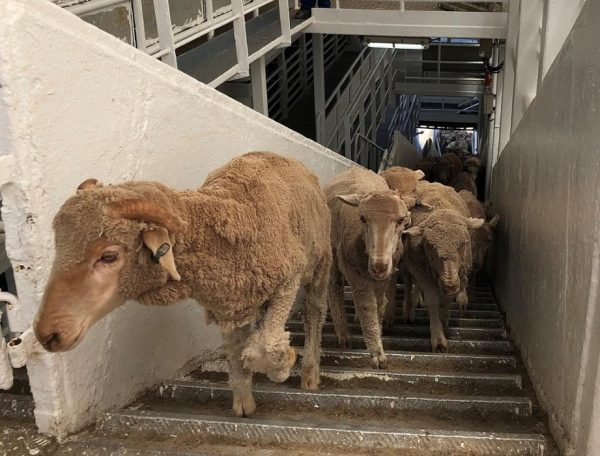
Australian sheep loading onto an export vessel.
A DISCUSSION paper listing options for future Middle East live sheep export regulation has been welcomed by industry, but is already under fire from the RSPCA.
Minister for Agriculture Bridget McKenzie released the Middle East sheep exports policy options discussion paper last week, inviting submissions up to October 28 this year.
Ms McKenzie said feedback on the discussion paper will inform a Regulation Impact Statement (RIS), which will determine the future regulation of live sheep exports to, or through, the Middle East during the northern summer months from 2020 onwards.
The discussion paper is available for comment online until 28 October 2019 at: haveyoursay.agriculture.gov.au
The paper’s policy option ideas are:
1) Three month prohibition — Conditions under the Middle East Order apply for the northern summer months and industry continue to use the existing HSRA model or agreed animal welfare indicators.
2) Apply the 2019 prohibition period — Conditions under the Middle East Order apply for the northern summer months. The department would remove the requirement for a HSRA on live sheep export voyages to, or through, the Middle East.
3) Adopt a revised HSRA model with risk settings based on heat stress thresholds or agreed animal welfare indicators.
4) No prohibition — live sheep exports to, or through the Middle East would be permitted 12 months of the year. Conditions under the Middle East Order apply for the northern summer months and industry continue to use the existing HSRA model.
Ms McKenzie said the government is seeking input from stakeholders on the potential economic and regulatory impact of each idea but also welcome alternative options.
“I urge anyone who has a stake in Australia’s live sheep export industry to jump online and have their say on the discussion paper.”
RSPCA says options represent a “backflip”
The RSPCA last Friday said the discussion paper reveals a proposed backflip on animal welfare safeguards introduced earlier in the year, claiming that option 3 “is a significant backwards stumble, involving the removal of the prohibition period for live sheep exports during the highest risk months of the year – a dangerous outcome that the RSPCA believes is completely unacceptable”.
The RSPCA said it is further seriously concerned that the revised heat stress model – a fundamental component of the regulatory reforms proposed over the past 18 months recommended by the McCarthy Review, the Moss Review, and the Heat Stress Risk Assessment Review – is missing from three of the four options.
The RSPCA said the only viable option to protect the welfare of Australian live exported sheep while the trade continues is to prohibit the highest risk months of the year – as the government has started to do this year – and introduce the revised heat stress risk assessment model, which the government has already committed to doing on multiple occasions.
“This is, effectively, a combination of options 2 and 3 and would provide greater certainty to everyone concerned including the community, government, trading partners, and the industry.
“The Australian Government has repeatedly said it will be guided by the science, and the science is crystal clear,” the RSPCA said.
“Any other course of action is not backed by the science or evidence; and represents a backflip on the government’s previous assurances, as well as an unmitigated failure to act on the community’s concerns.”
A spokesperson for Ms McKenzie said the four policy options outlined in the paper are purposely different in order to explore the full range of options.
“The department is seeking input from stakeholders on the economic and regulatory impact of each option and also welcomes proposals of, and input for, alternative options.
“The final policy decision on the management of heat stress in sheep exports to, or through, the Middle East will make tangible, positive steps towards improved animal welfare outcomes and support the sustainability of the live sheep export trade,” the spokesperson said.
ALEC urges regulation based on science and evidence
Australian Livestock Exporters’ Council chief executive officer Mark Harvey-Sutton said science and evidence should dictate all future regulatory decisions regarding live exports and ALEC looked forward to being involved in the process.
“Animal welfare is the key priority for the livestock export industry and Australian Livestock Exporters’ Council (ALEC) member exporters go to great lengths in their voyage preparation to ensure that animal welfare is of the highest standard.
“The sheep exports to the Middle East undertaken in May of this year achieved excellent animal welfare outcomes and record low mortalities using the new reduced stocking densities, and we expect similar animal welfare outcomes for this month’s shipments,” he said.
“Transparency and consultation will only encourage genuine dialogue and build trust in the policy process, this review will take time and it is important to consider all the information provided in the review process.”
ALEC encouraged and supported all interested parties to engage with the review and to put forward options in order to achieve the best animal welfare outcomes

HAVE YOUR SAY